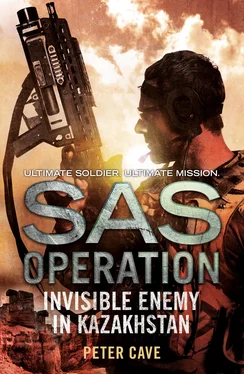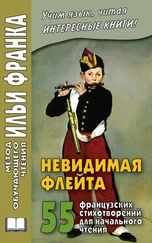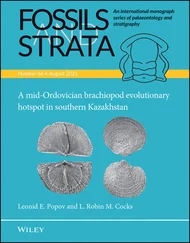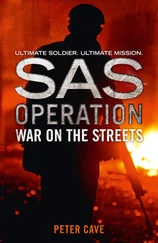The two men strolled unhurriedly towards the luxury motor cruiser, which stood out like a sore thumb among the jumble of dilapidated river fishing craft. Weiss thought, momentarily, of the loaded Luger he kept in his cabin locker, quickly dismissing it. If the men were coming for him they would be trained agents, armed and alert. Besides, even if he did manage to kill them both, others would follow. They knew where he was now.
It seemed best to play innocent, attempt to bluff it out. There was at least a reasonable chance of getting away with it, Weiss reasoned. His false Swiss identity papers were the flawless work of a master forger, and his assumed identity was rock solid. And, even if that failed to impress his investigators, he had distributed vast sums in bribes to corrupt Bolivian officials in high places. That should protect him against an official attempts at extradition. Of course, they might have plans to smuggle him out of South America forcibly. Or simply to kill him where he was. In which case, his six-year run of good luck would have finally run out.
Weiss had developed a philosophical attitude to what had basically been a second life for him. He had been incredibly lucky, and more than a little cunning. When the Allies had liberated Auschwitz, he had managed to slip through the net disguised as one of the Jewish prisoners. Undetected even after six weeks in a temporary transit camp, he had finally managed to buy his ticket to freedom from an American sergeant for a handful of gold nuggets. Whether that sergeant had ever known that those nuggets came from the dental fillings of murdered Jews, Weiss had never known, or cared. He had evaded everybody – even the British SAS units on special duty to round up and arrest known and suspected war criminals. At the time, that was all that had mattered.
For the gold itself, Weiss had cared even less, for it had represented but a small fraction of the fortune in stolen jewelry and valuables he had amassed during his four years in the death camp. It was that fortune which had bought him the identity of Conrad Weiss, a retired Swiss watchmaker, and his passage to Bolivia.
But luck was at best a temporary phenomenon. The two men now mounting the gangplank of his boat both testified to that.
Bluff it out, then. Play the cards you held and hope for the best, Weiss decided. Propping himself up against the stern rail, he tried to look innocently surprised.
The first man aboard had a smile on his face, but his eyes were cold.
‘Herr Weiss?’
The reply was non-committal. ‘Who wants to know?’
‘Ah, you are worried, cautious. As of course you should be,’ Tovan Leveski murmured in good German. His hand dropped slowly and gently towards the front of his well-cut jacket, slipping open the buttons. He studied Weiss’s eyes, following every move.
‘Let me assure you, Herr Weiss, that we mean you no harm. We are not what you probably think we are. For a start, both of us are completely unarmed.’ Leveski pulled his jacket aside carefully, to show that he was not wearing a waist or shoulder holster. He half-turned to his companion, motioning for him to do the same.
Weiss’s surprise was genuine now. ‘Who are you? What is it you want with me?’
‘Just to talk. We have a little proposition to put to you. One that I think you will find extremely fascinating, my dear Doctor.’
The German’s sharply honed survival instinct cut in automatically, despite Leveski’s disarming manner.
‘Doctor? Why do you call me doctor? I was a simple watchmaker in Switzerland until my retirement.’
The cold smile dropped from Leveski’s face. ‘Please do me the courtesy of crediting me with intelligence, Doctor. I have not come all this way to be insulted. You are Dr Franz Steiner. You were in charge of the medical research facility at Auschwitz from 1941 to 1945. Your highly specialized work concerned the grafting and transplantation of amputated limbs in human subjects. You were several years ahead of your time in recognizing the problems of spontaneous rejection – a problem which, I might add, has since been much more widely studied.’
Something told Steiner that, armed or not, Leveski was not a man to antagonize. His bluff had been called, yet no threats had been offered – only a tantalizing reference to his work. Steiner found himself increasingly fascinated.
‘You have overcome the rejection problem? Isolated the antibodies which cause it?’
Leveski shook his head. ‘Not yet, Doctor. But we will – or rather, you will. With our help, of course.’
Steiner suddenly realized that his first question remained unanswered. He repeated it. ‘Who are you? What do you want with me?’
Leveski dipped his hand carefully into the inside pocket of his jacket and drew out his identity card, which he flashed under Steiner’s nose. ‘My name is Tovan Leveski. My companion is Viktor Yaleta. As you see, we are both official representatives of the government of the USSR.’
Leveski saw the look of uncertainty which flickered across the German’s ice-blue eyes. ‘You are surprised, Doctor. You should not be. The fact that we may have been enemies in the past has no relevance to our business here today. It is something which transcends accidents of birth, mere geographical boundaries. We are talking about science, Doctor – pure science. Medical reasearch – the very future of the human race. Does that not interest you?’
Steiner shrugged off the pointless question. ‘Of course. Who could fail to be interested?’
Leveski nodded towards the hatch which led down to the boat’s cabin. ‘Then perhaps we can discuss this in greater comfort?’
Nodding thoughtfully, Steiner turned, leading the two Russians to the short companionway.
‘So, how did you find me?’ Steiner asked, more relaxed now that the danger seemed to have passed, and mellowed by a large glass of local brandy.
Leveski smiled. ‘Find you, Doctor?’ He inclined one shaggy eyebrow. ‘We never lost you. We have known your exact whereabouts since 1946. We simply had no use for your particular talents until now. Your work was well ahead of its time, as you probably realize.’
Steiner sipped at his brandy. ‘And what exactly are you offering me?’
Leveski spread his hands in an expansive gesture. ‘Virtually anything, my dear Doctor. The resources of the finest and most comprehensive research facility in the world. Unlimited funds, an inexhaustible supply of human subjects for experimentation. And, probably most important to you, Doctor, total freedom to conduct biological experiments without any ethical or moral restraints. The chance to play God, in fact.’
Even if Steiner had not already been hooked, this last phrase would have clinched it. His eyes had a dreamy, faraway glaze to them. ‘This research establishment you spoke of. What is its actual purpose?’
‘To push the boundaries of medicine, surgery and biochemistry to their ultimate limits – and then beyond,’ Leveski said grandly. ‘To dream impossible dreams, and then to make those dreams come true. To travel on unknown roads – and to make new maps for others to follow in the future.’
Steiner’s heart surged. It seemed that he had heard such dreams outlined before, not so long ago. But those dreams had gone sour, decried and finally smashed to dust by a world which did not understand. Now, suddenly, it was as if he were being given a second chance.
‘And my colleagues? Who would I be working with?’ he wanted to know.
‘Others like yourself. Scientists who have dared to work in areas avoided by the squeamish and faint-hearted. We scoured Europe for them – the concentration camps, the germ-warfare establishments, the genetic study centres set up by your late Führer in his dream of a pure master race. All supplemented with the cream of our own scientists, of course.’
Читать дальше












